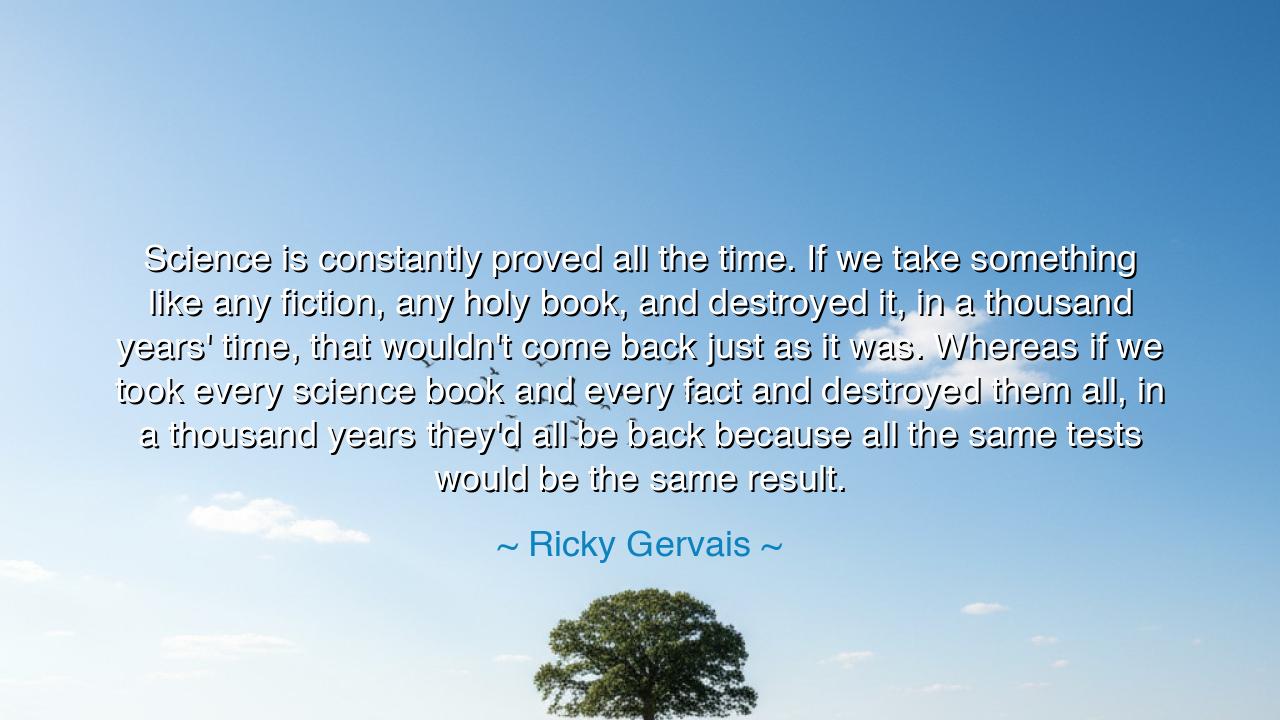
Science is constantly proved all the time. If we take something
Science is constantly proved all the time. If we take something like any fiction, any holy book, and destroyed it, in a thousand years' time, that wouldn't come back just as it was. Whereas if we took every science book and every fact and destroyed them all, in a thousand years they'd all be back because all the same tests would be the same result.






“Science is constantly proved all the time. If we take something like any fiction, any holy book, and destroyed it, in a thousand years' time, that wouldn't come back just as it was. Whereas if we took every science book and every fact and destroyed them all, in a thousand years they'd all be back because all the same tests would be the same result.” So speaks Ricky Gervais, a voice from our age who, though known for jest and satire, here proclaims a truth of great weight. His words cut to the heart of what makes science unlike any other form of knowledge: it is not preserved by tradition, nor bound to one people or one book, but proven by the very fabric of reality.
The origin of this thought lies in the eternal distinction between human invention and natural law. Stories, scriptures, and fictions are woven by culture, passed down by memory, and guarded by faith. Should they be destroyed, they may never return in their same form, for they depend on the words of men. But science does not depend on memory; it rests on the universe itself. The law of gravity is not written in a single book but inscribed in the falling of every stone. The principles of mathematics do not vanish with the burning of a library, for they are eternal, waiting to be discovered anew.
History gives us a vivid proof. When the Library of Alexandria fell to flame, countless scrolls were lost forever—poems, histories, philosophies. But the truths of science it contained were not truly destroyed. Though Greek geometry was scattered, centuries later Euclid’s principles were rediscovered. Though astronomy faltered in the Dark Ages, the same stars wheeled overhead, and men like Copernicus and Galileo charted their paths anew. The laws of nature cannot be erased, for they dwell not in parchment but in the cosmos itself.
Consider also the tale of Archimedes, who in ancient Syracuse discovered the principles of buoyancy. His works were partly lost, hidden in palimpsests and fragments. Yet the principle he uncovered—now called Archimedes’ law—was never lost, for any man who places an object in water and observes its rise may discover it again. This is the power of science: it is not dependent upon the survival of texts, but upon the eternal repeatability of the world’s laws.
Gervais’s words also contain a subtle rebuke. They remind us that while myths and sacred texts may inspire, they are bound to time, place, and culture. Science, by contrast, belongs to all humanity, for its truths can be tested by anyone, anywhere, at any time. Fire burns in Africa as it burns in Asia. The planets circle above the farmer in India as they do the shepherd in Greece. The universality of science is its glory: it is not the property of one people, but the shared inheritance of all.
Yet let us not mistake his words as contempt for stories or scripture. Fictions and holy books hold wisdom of another kind: they shape meaning, morality, and imagination. But they are not provable in the way science is. Their truths are subjective, symbolic, or spiritual. The unique wonder of science is that its truths are objective, drawn not from faith but from the eternal consistency of nature. This distinction does not diminish the value of culture, but exalts the uniqueness of science.
So, O listener, take this lesson into your life: treasure the stories that give your days meaning, but never confuse them with the laws that govern the stars. If all were lost, if civilization itself fell to ruin, know that the laws of nature would still endure, waiting for the hand of man to rediscover them. Thus live as a seeker of truth: question, test, and observe. Let your beliefs guide your heart, but let science guide your understanding of the world. For as Gervais reminds us, when all else fades, the universe itself is the book that cannot be destroyed.






AAdministratorAdministrator
Welcome, honored guests. Please leave a comment, we will respond soon